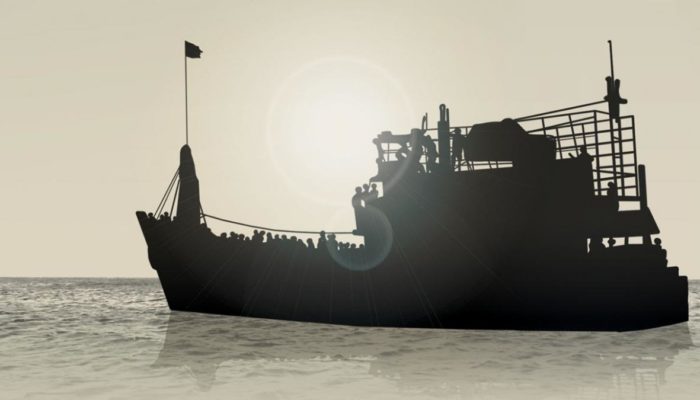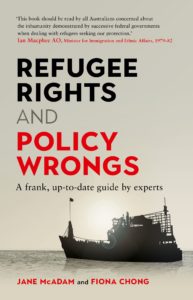Book Review: ‘Refugee Rights and Policy Wrongs: a frank, up-to-date guide by experts’ – Jane McAdam and Fiona Chong
“Refugee Rights and Policy Wrongs: a Frank, Up-to-date Guide by Experts”, Jane McAdam and Fiona Chong, UNSW Press, 2019, 277 pages
This book by legal academics from the Kaldor Centre at the University of New South Wales is a lay person’s introduction to the requirements of international refugee law. It also makes the comparison with current Australian policy and practice, which comes up well short. As well as the Refugee Convention, the following relevant treaties are covered: the International Covenant on Civil and Political Rights (ICCPR), the Convention against Torture (CAT), the International Covenant on Economic, Social and Cultural Rights (ICESCR), and the Convention on the Rights of the Child. The last was an important factor in the recent decision on the Biloela family case. Its coherence and focus make the book accessible to non-lawyers, and it reflects the views of refugees and experts. The complexity of legal and bureaucratic arrangements necessitates technical and complicated explanations at times, and it is another strength of the book that it provides these. There is an index and extensive endnotes.
Image Source: New South Books
Readers expecting something new should note that this is an updated version of the 2014 book “Refugees: Why Seeking Asylum is Legal and Australia’s Policies are Not” by the same authors, and largely follows its structure and content. The Liberal National government changes are reported, such as new visa categories, fast track reviews, Temporary Protection Visas (TPVs) and various Migration Act amendments. A second warning: being a legal guide, this book skims across the politics and debates and is not a guide to the many issues which are so challenging to policy and politics, nor does the book deal with the new threats to refugee policy which I mention below.
The book’s title signals a critical perspective, and its recommendation is “just follow the Refugee Convention law which you signed up to” in its spirit and precedents. This reader’s conclusion from the book is that our government interprets, bends and breaks much of the law with impunity. We are not the only country to do so (for a historical comparison, Claire Higgins, also of the Kaldor Centre, has written a fascinating book drawn from an insider’s view about how refugee processing worked in the context of the 1970s Vietnamese evacuations).
In the introduction one of the authors relates a conversation that she had with a Sydney taxi-driver. She attempted to set him straight on the facts about refugees in the hope that she could wean him off his thoughtless acceptance of the views of Ray Hadley of 2GB. The anecdote will resonate with many refugee advocates. We are tempted to believe that if we can just get the facts out there to enough people we can get a change in the national mood, and politicians can be pushed to follow. This seems to be what the authors are arguing. They note that our government’s response to the problem is influenced by xenophobia, racism and nationalism (p. 38), and that combating these unwelcome influences requires first, strong political leadership and second, public education. How to do this? Unfortunately, as a positivist record of the law and its implementation, the book is of little help to a campaign response.
Regarding public education, “more facts” is an approach increasingly rejected as the path to agreement by experts in “effective messaging” such as Anat Shenker-Osorio, a US adviser who has worked with the Centre for Australian Progress and the Asylum Seeker Resource Centre (ASRC). Instead of a campaign negativism based around “Don’t” and “No to…”, Shenker-Osorio asks “where is the story of solutions?”
Where can we expect political leadership to come from? The wider human rights agenda is under global attack. Governments in all countries – whether they are signatories to the Refugee Convention or not – are responding to the current high point of long term refugees and low point of tolerance by pushing strongly to exclude refugee claimants and to limit their claims. The recent threat by President Erdogan to use refugees as a political weapon, by dispersing towards Europe 3.6 million Syrian refugees from Turkey, marks a new and dangerous development. Oppressiveness is not confined to “illiberal” governments: Jacinda Ardern’s government has tried to walk both sides of the fence and only recently changed NZ’s long-standing discriminatory policy towards African and Middle Eastern refugees. Theresa May as UK Home Minister was notorious for the Windrush scandal, which revealed racist influences on British policy and her “really hostile environment for illegal migration”.
Domestically, Labor takes its policy cues from the Coalition, despite some softening on implementation, such as its support for the New Zealand offer to take 150 of Australia’s offshore detained refugees annually, the Medevac legislation, and to make exceptions in special cases.
Refugee supporters in Australia may find it even more difficult to influence government policy in future. Fewer boats and reduced numbers in offshore detention may mean that their niggling reminder of our official meanness will disappear, and other worthy issues like climate change will fill the activism space. ABC, IPSOS and Lowy polling this year shows little positive change in the electorate’s support for offshore processing and boat turnbacks over the 6 years of Coalition government. In his TED talk and accompanying small book, David Miliband, the former UK Foreign Minister and now head of the IRC (International Rescue Committee) says, “I truly believe this, that the biggest question in the 21st century, concerns our duty to strangers…why they’re displaced, how they survive, what help they need, and what our responsibilities are.” Long term refugees seem to be largely a modern development, and recent political explosions in unpredicted places suggest a further growth is likely to occur.
Most of the signs are very dangerous for those seeking more rational and generous responses from a country with enormous capacity to provide it.
Kevin Bain reviews refugee books at Independent Australia, and has compiled a Reading Guide for Mornington Peninsula Human Rights Group.

